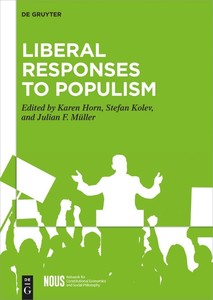Por favor, use este identificador para citar o enlazar este ítem:
https://repositorio.uca.edu.ar/handle/123456789/20024| Campo DC | Valor | Lengua/Idioma |
|---|---|---|
| dc.contributor.author | Salinas, Alejandra M. | es |
| dc.date.accessioned | 2025-07-07T14:56:41Z | - |
| dc.date.available | 2025-07-07T14:56:41Z | - |
| dc.date.issued | 2025 | - |
| dc.identifier.isbn | 9783111575643 | - |
| dc.identifier.uri | https://repositorio.uca.edu.ar/handle/123456789/20024 | - |
| dc.description.abstract | Berlin and Laclau understood that only a comprehensive analysis, composed of philosophical presuppositions and relatively abstract political concepts grouped in general arguments, could offer such an account. Berlin was among the first to explain the specificity of populism from this angle; Laclau has been the most influential. In their understanding, populism consists in a division between “the people” and the groups they consider to be their antagonists. Both agree that the specific profiles of “the people” and their antagonists are contingent, as they vary with historical and local circumstances. Both acknowledge that various forces and social demands may take on a populist nature, and that they can be found in different political systems. Additionally, both emphasize the crucial role of emotions in fostering the bonds of solidarity among the people and an antagonistic attitude towards everything labelled as non-populist. In sum, both present a theory that adapts to a variety of ideological contents, whether left or right, and to a wide range of movements, regimes, and agents that may invoke the categories of mobilization, affect, and political antagonism to pursue a populist project. In the following sections, I will present and compare the contributions of Berlin and Laclau to the understanding of populism; discussing whether populism can be regarded as a secular religion, as some believe. I will conclude by highlighting some challenges of populism to liberal democracy. | es |
| dc.format | application/pdf | es |
| dc.language.iso | eng | es |
| dc.publisher | De Gruyter | es |
| dc.rights | Atribución-NoComercial-CompartirIgual 4.0 Internacional | * |
| dc.rights.uri | http://creativecommons.org/licenses/by-nc-sa/4.0/ | * |
| dc.source | Horn, K., Kolev, S., y Müller, J. F. (Eds.). (2025). Liberal Responses to Populism. De Gruyter | es |
| dc.subject | FILOSOFIA POLITICA | es |
| dc.subject | POPULISMO | es |
| dc.subject | DEMOCRACIA | es |
| dc.subject | LIBERALISMO | es |
| dc.subject | Berlin, Isaiah, 1909-1997 | es |
| dc.subject | Laclau, Ernesto, 1935-2014 | es |
| dc.title | The political philosophy of populism in the writings of Isaiah Berlin and Ernesto Laclau: a comparative approach | es |
| dc.type | Parte de libro | es |
| dc.identifier.doi | 10.1515/9783111575643-013 | - |
| uca.issnrd | 0 | es |
| uca.affiliation | Fil: Salinas, Alejandra M. Universidad Nacional de Tres de Febrero; Argentina | es |
| uca.affiliation | Fil: Salinas, Alejandra M. Pontificia Universidad Católica Argentina; Argentina | es |
| uca.version | publishedVersion | es |
| item.fulltext | With Fulltext | - |
| item.languageiso639-1 | en | - |
| item.grantfulltext | mixedopen | - |
| Aparece en las colecciones: | Libros/partes de libro | |
Ficheros en este ítem:
| Fichero | Descripción | Tamaño | Formato | Login |
|---|---|---|---|---|
| political-philosophy-populism.pdf | 108,55 kB | Adobe PDF | SOLICITAR ACCESO | |
| liberal-responses-populism.jpeg | 86,23 kB | JPEG |  Visualizar/Abrir |
Este ítem está sujeto a una Licencia Creative Commons

